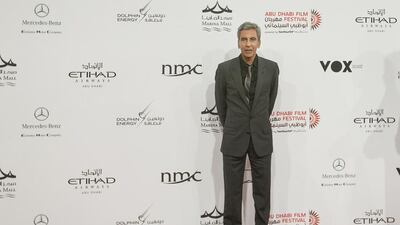Rachid Bouchareb decided years ago that he wanted to work with Forest Whitaker – he just didn’t have a film to make it happen.
It took a look back to an old French thriller from his youth, 1973's Two Men in Town (Deux Hommes dans la Ville), to light a creative spark in the French-Algerian director's mind.
In that film, screen icon Jean Gabin plays a safe-cracker newly released from prison and stalked by Alain Delon’s vengeful cop. Bouchareb took this tale and shifted the setting to the border between the US and Mexico, an area overrun with illegal immigration and crime.
If that wasn’t enough, he upped the dramatic potential further by making the protagonist, played by Whitaker, an African-American ex-con who has recently converted to Islam, with veteran actor Harvey Keitel taking on the role of the cop.
Two Men in Town is just the most recent in a long run of films from Bouchareb to tackle racial and religious tensions. The son of Algerian parents who arrived in France in the wake of the Second World War, the themes of immigration and identity litter many of his films, from his 1985 debut, Bâton Rouge to 1995's Oscar-nominated Dust of Life and 2001's Little Senegal.
“Immigration is part of my history,” he says. “It has been a big part of my life – my parents life, my family life, my own life. My environment was a good climate to fish for these stories.”
The veteran director was in the capital on the weekend to pick up a Career Achievement Award at the Abu Dhabi Film Festival.
Addressing the audience at a talk celebrating his work, Bouchareb traced his love of cinema back to slipping into cinema screenings without a ticket while growing up in Paris.
“But I always missed the beginning because we were sneaking in,” he laughs.
After launching a career in television in the late 1970s, Boucharab found success on the big screen as a director in the mid-80s. In 1991, necessity led him to branch out into producing on the self-directed Cheeb, a dual role he has continued by producing his own work up to and including Two Men in Town.
“Being a producer solved a lot of problems for me,” he says. “There were difficulties making films – we were part of [a movement] of young filmmakers from North Africa who wanted to change things. It was a new generation and things were hard for us.”
However it is 2006's Days of Glory for which Bouchareb is likely to be best remembered, a film that created shock waves beyond the world of cinema by portraying the French government's discrimination against the North African soldiers who fought during the Second World War.
After the film’s Cannes premiere, and a lengthy campaign by Bouchareb, President Jacques Chirac was moved – or manoeuvred – into changing the French law to grant partial pension rights to around 80,000 surviving veterans.
“It was not money they were waiting for,” says the director. “It was recognition.”
Before leaving the UAE, one question put by fans to the legend was, of course, whether he’d like to work in the region.
“If there was funding, I’d obviously love to come – why not?” he says.
“It’s different here [to home], but I don’t think I would feel estranged. I feel like [Algeria and the UAE] are talking in the same vocabulary, and when I go for a walk [in Abu Dhabi] I recognise the same stories.”
rgarratt@thenational.ae

